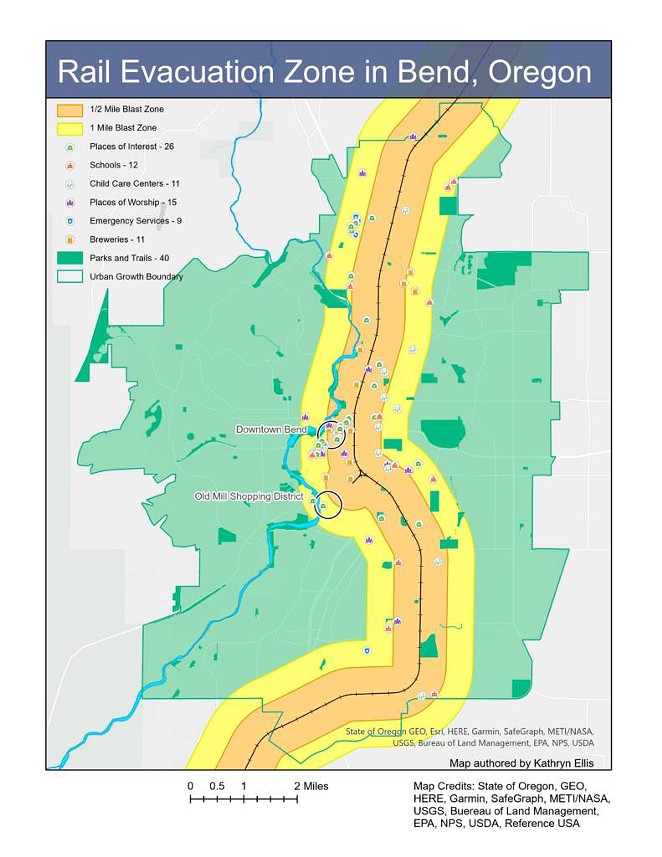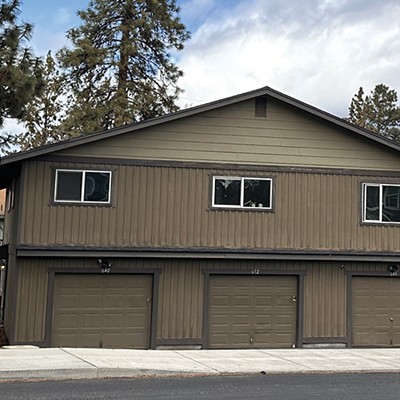We have to admit: When the Bend City Council adopted a resolution in 2021 that declared opposition to seeing rail cars carrying fossil fuels run through the city, we were dubious. What could a small city like Bend do to actually make things safer, in the face of petroleum companies and the other private enterprises that run that system?
Turns out, though, that resolution may have not gone far enough.
Americans have watched in horror this month at the train derailment in East Palestine, Ohio, where cars carrying materials for making plastic went up in flames. Later, more train cars were intentionally set alight in order to prevent an even more dangerous blast. Some chemicals have since been found in the Ohio River, though authorities there claim it's safe for people to drink the municipal water. But as the people watch fish die and their animals suffer, some there now wonder whether their town will ever recover. It's a disaster that has us eyeing that set of tracks that runs straight through our little city and has us wondering what calamities could befall us if something like the East Palestine disaster could happen here.
According to reports, overheated wheel bearings were the cause of the derailment – which appears to be a preventable cause. In December, President Biden and Congress averted a railway strike by passing a law against such strikes. Railroad employees, by way of their unions, were pushing for paid sick leave — something that's now available to all Oregonians as of this year. Was someone's carelessness related to their disgruntlement? It makes one wonder.
Here in Bend, city councilors discussed and then passed the resolution that officially opposed "U.S. crude oil" by rail in May 2021. While we were philosophically in agreement with that, it felt – at the time – to be an effort akin to spitting in the wind. Why waste time on it when it would do nothing except share our collective dismay at something that seems so entrenched. The rail companies in charge of the tracks through Bend won't even let us have passenger trains on those rails –as much as people would love that – let alone submitting to eschewing crude oil cars, or even moving the tracks away from town. It's easy to be defeatist in the face of such massive wealth and influence as the Burlington Northern Santa Fe.
Still, here's the thing: Should a train carrying fossil fuels – or, perhaps worse, carrying highly volatile materials for making plastics – derail and create a blast, a great number of the citizens of Bend would be within the 1-mile blast zone. Some 12 schools — or 47% of Bend's schools — are within that blast zone, according to research from the Sightline Institute. Some 50% of Bend's parks are within that zone. Bend leaders are spending a lot of time advocating for development in the Bend Central District, much of which runs adjacent to the tracks. A new development at the old Les Schwab site on Franklin Avenue, called The Platform, aims to house hundreds of new residents, whose view will include those tracks. Another new development in the Kor Pine area, Timber Yards, is also near the tracks and will house many more people if approved. Many of Bend's current and future assets run right along those tracks.
So what can we do?
While we were dubious about the success of a resolution opposing crude oil transport by rail in 2021, in light of the devastation we are seeing in East Palestine, now we think that perhaps it's time to rethink that resolution in 2023. Did it include broad-enough language that could have shown opposition to not just the devastation of fuel transported through — and often not even destined for — our state, but also opposition to other harmful materials?
Bend by itself may not be able to do much, but, as the environmental advocacy group 350Deschutes put it, "Any potential solution to the problem must come from the federal government, and a collective push from city and state governments should stimulate awareness at the national level."
Bend and the other cities of the region with fuel and hazardous materials running through their towns can, then, be part of a collective effort to make change. If we say nothing, we'll most certainly get the status quo.






















